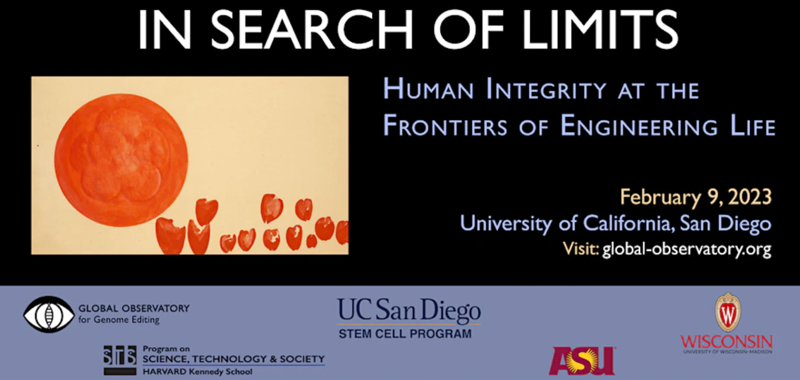Feb 9, 2023–Feb 9, 2023 from 9:00am–5:00pm
Stem Cell Ethics 2023: In Search of Limits in the Age of Genome Editing

Stem Cell Ethics: Synthetic Embryos In Search of Limits in the Age of Genome Editing: Human Integrity at the Frontiers of Engineering Life
This workshop, the second in a series, explores the narratives of promise, purpose, and perfectibility that animate frontiers developments in biotechnology.
Southern California Stem Cell Seminar Series: Hertzberg Schechter Lecture
"Ex Utero Embryogenesis: Naive Pluripotent Stem-cells-derived Embryoid Models (SEMs)" Jacob Hanna, Weizmann Institute of Science in Isreal
Panel 1: Limits of Research Moderator: J. Benjamin Hurlburt, ASU
Panelists:
Jacob Hanna, Weizmann Institute of Science
Alysson Muotri, UC San Diego
Matthew Porteus, Stanford University
Panel 2: Cosmopolitan Ethics in Public Deliberation Moderator: Krishanu Saha, U. of Wisconsin-Madison
Panelists:
Rosemarie Garland-Thompson, Emory University
Reuven Brandt, UC San Diego
John Evans, UC San Diego
Nasser Zakariya, UC Berkeley
Panel 3: Limits of Public Governance Moderator: John Evans, UC San Diego
Keynote: Carrie Wolinetz, NIH
Panelists:
Maria Millan, CIRM
Sheila Jasanoff, Harvard University
Derek Thompson, The Atlantic & The Ringer
Event Description:
This workshop, the second in a series, explores the narratives of promise, purpose, and perfectibility that animate frontiers developments in biotechnology. These narratives have circulated widely around technologies that intervene in human development in the name of doing nature better. Examples include genome-edited babies, stem cell-derived synthetic embryos, and human neuronal systems grown in vitro. Those leading these strides in bioengineering are often aware of a need to question, and if possible reaffirm, the nature of and moral justification for limits on scientific research and intervention. Recent years have seen the emergence of a global patchwork of laws, policies, recommendations, proposals, conventions, and declarations that respond to these concerns by defining and delimiting the field of permissible research that intervenes in human development and reproduction.
These Observatory workshops seek to illuminate the junctures at which scientific communities and their interlocutors in society do, or do not, engage with questions of limits: limits on what knowledge should be pursued, through what means, and how such knowledge should be translated into technological applications; limits on the range of ethical questions that should be asked, the scope of deliberation, and extent of participation within and beyond science; and limits on the forms of reasoning, evidence, and expertise that inform democratic deliberation and decisions on governance.
How has the need for new limits been understood and approached in emerging research domains where codes of ethical conduct are not yet in place? How are expressions of ambivalence or disagreement about what research should or should not be done accommodated? What institutions, if any, do scientists see as serving their need for guidance or oversight in uncharted territories? What role are universities and professional bodies playing in addressing the demand for limits in a changing landscape? To what extent do institutional design choices and the framing of questions for debate reflect national traditions of expert or democratic deliberation?
Given the complexity of the ethical landscape and the variety of processes at work in setting limits, these workshops are designed to think systematically about how limits to biotechnologies at the frontiers of human life are being defined and to identify salient issues and positions that may be receiving less attention than deserved. This workshop, therefore, seeks to further the Global Observatory’s mission of broadening the present scope of deliberation, centering not just on the limits themselves, but also on the processes that institutionalize them, the voices that contribute to them, the human values that animate them, and the forces that may push back against them.
Agenda
9:30 AM - 10:30 AM
Southern California Stem Cell Seminar
Jacob Hanna, Weizmann Institute of Science
Hosted by: Alysson Muotri, UC San Diego
Talk Title: "Ex Utero Embryogenesis: Naive Pluripotent Stem-cells-derived Embryoid Models (SEMs)"
11:00 AM - 12:30 PM
Panel 1: Limits of Research
Moderator: J. Benjamin Hurlburt, ASU
Alysson Muotri, UC San Diego
Matthew Porteus, Stanford University
Jacob Hanna, Weizmann Institute of Science
Limits of Research: Exploration of controversial case studies over the limits on research and limitations of scientific deliberation/dissent/ambivalence about such limits. How do the research communities contend with controversial science?
12:30 PM - 1:03 PM
Lunch
Lunch will be provided by Bella Vista Caffe' for those who are registered for the event.
1:30 PM - 3:00 PM
Panel 2: Cosmopolitan Ethics in Public Deliberation
Moderator: Krishanu Saha, U. of Wisconsin-Madison
Rosemarie Garland-Thompson, Emory University
Reuven Brandt, UC San Diego
John Evans, UC San Diego
Panel Discussion: How do structures and practices of privatization and commercialization affect capacities for deliberating and defining limits? How do questions of purpose, desirability, and public and private interest?
3:30 PM - 5:00 PM
Panel 3: Limits of Public Governance Keynote: Carrie Wolinetz, NIH
Moderator: John Evans, UC San Diego
Keynote: Carrie Wolinetz, NIH
Maria Millan, CIRM
Derek Thompson, "The Atlantic"
Panel Discussion: How do visions and norms of scientific progress inform, encourage or constrain democratic governance of science? How do questions of warrant, purpose, and benefit get asked and answered
Hosted by: The UCSD Stem Cell Program
Organizer of Stem Cell Ethics 2023: In Search of Limits in the Age of Genome Editing
About the Stem Cell Program
The UC San Diego Stem Cell Program’s commitment to our scientific community allows for providing laboratories access to our cutting edge technologies with our service cores. Providing video education to our community through the Stem Cell Channel and to the future scientists at UC San Diego and other institutes with CMM 250 graduate studies elective course.
Date and Time
Feb 9, 2023–Feb 9, 2023
from 9:00am–5:00pm
Location
Event Registration
Registration is not required for this event.
Event Fee
Free
Contact
Cat Leija • cdleija@health.ucsd.edu
Audience
Faculty, Staff, Students, The General Public
Event Host
The UCSD Stem Cell Program